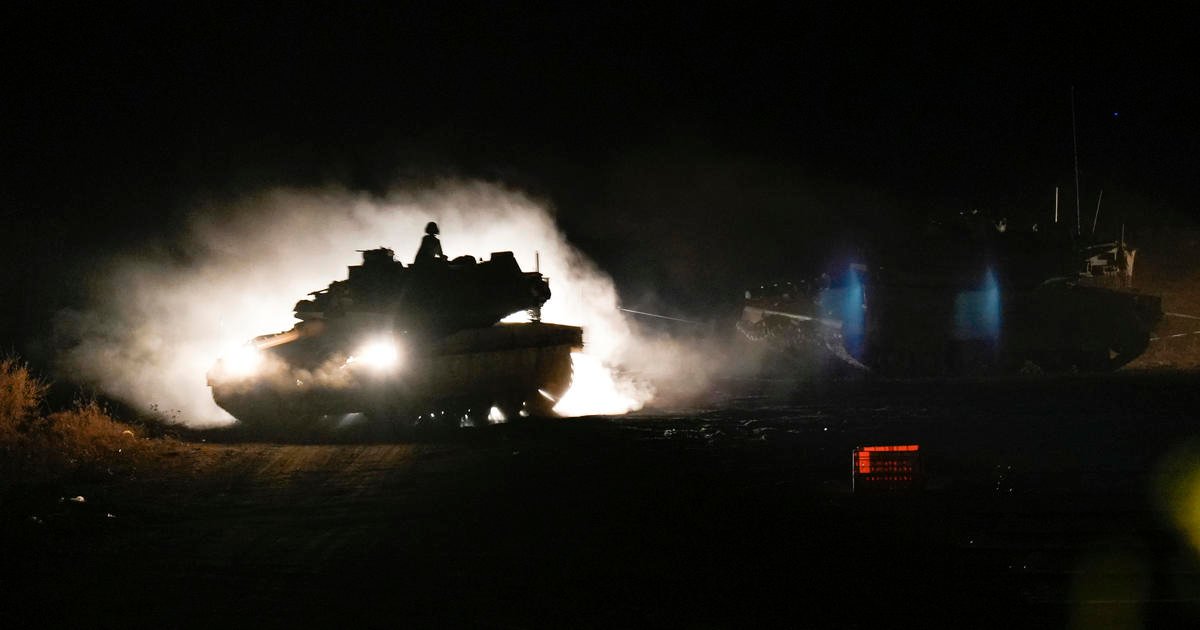The Israeli army announced that it had begun a “limited and localized” ground operation against Hezbollah targets in southern Lebanon.
In posts circulated on social media, the Israeli army said it carried out “targeted” ground raids in villages close to the Israeli border.
The army said: “A few hours ago, the Israeli army began limited, local and targeted ground raids based on accurate intelligence information against Hezbollah terrorist targets and infrastructure in southern Lebanon.” He added, “These targets are located in villages close to the border and pose a direct threat to Israeli communities in northern Israel.”
An Israeli tank in northern Israel near the Israel-Lebanon border on Monday, September 30, 2024. Baz Ratner/AP
The Israeli army said that the operation was planned in recent months and was launched after the approval of political leaders. The movement of forces comes days after Israeli air strikes that led to the killing of Hezbollah leader Hassan Nasrallah and a number of the group’s leaders in Beirut.
The army said, “The Israeli Air Force and IDF artillery support the ground forces with precise strikes on military targets in the region.”
Israel said its air operation on Iranian-backed groups in Lebanon – an operation it calls “Arrows of the North” – will continue “in parallel with the fighting in Gaza and in other arenas.”
Israel expanded its airstrikes in Lebanon and beyond over the weekend, launching strikes thousands of miles away on Houthi rebels in Yemen. These strikes came amid growing concerns that the war Israel has been waging for nearly a year against Hamas in the Gaza Strip and Hezbollah in Lebanon could turn into a full-scale regional conflict, drawing Iran and even the United States to support their allies.
Earlier Monday, a US official confirmed to CBS News that Israel had informed the US that it intended to launch a limited ground incursion into Lebanon.
In another sign that an invasion was imminent, Israel declared three small border communities a “closed military zone,” restricting access only to military personnel.
There were no reports of direct clashes between Israeli forces and Hezbollah militants. But throughout the evening, Israeli artillery units bombarded targets in southern Lebanon, and the sounds of air strikes were heard throughout Beirut. Smoke rose from the southern suburbs of the capital, where Hezbollah has a strong presence, shortly after Israel called on residents of three buildings to evacuate.
A Lebanese policeman looks at damaged apartments hit by an Israeli raid early Monday, September 30, 2024, in Beirut. Hussein Al-Mulla/AFP
Israel has been emboldened by its recent battlefield gains against Hezbollah, and appears determined to deal a fatal blow to its arch enemy. But the ground operation represents a new phase of the fighting and may be fraught with danger. It also threatens to unleash more devastation in Lebanon, where hundreds have been killed in recent Israeli strikes and hundreds of thousands displaced.
Hezbollah is a well-trained militia that is believed to have tens of thousands of fighters and an arsenal of 150,000 rockets and missiles. The last round of fighting in 2006 ended in a stalemate.
Both sides have spent the past two decades preparing for the next confrontation. While Hezbollah has built a massive arsenal of weapons, Israel has invested large sums in training and intelligence gathering. The recent air strikes that eliminated most of Hezbollah’s senior leaders and the explosions of hundreds of Hezbollah pagers and walkie-talkies indicate that Israel has infiltrated deep into the group’s upper levels.
Hezbollah pledged on Monday to continue fighting even after its recent losses. The group’s acting leader, Naeem Qassem, said in a televised statement that Hezbollah would be ready for a ground operation. He said that commanders killed in recent weeks had already been replaced.
The man widely expected to take over from Qassem is Hashem Safi al-Din, Nasrallah’s cousin who oversees Hezbollah’s political affairs.
Israeli strikes in recent weeks have hit what the army says are thousands of armed targets in large parts of Lebanon. More than a thousand people were killed in Lebanon during the past two weeks, nearly a quarter of them women and children, according to the Ministry of Health.
Early Monday, an airstrike hit an apartment building in central Beirut, killing three Palestinian militants, as Israel appeared to send a message that no part of Lebanon is off limits.
Israel declared war on the armed Hamas movement in the Gaza Strip after a cross-border Hamas attack last October 7 that killed 1,200 Israelis and took 250 others hostage. Hezbollah began firing missiles at Israel the next day.
Israel and Hezbollah have exchanged fire almost every day since then, and have come close to all-out war on several occasions, but have stepped back from the brink.
But as Israel’s war against Hamas has subsided in recent weeks, it has shifted its focus north toward Lebanon and intensified its attacks on Hezbollah. It says it will continue to strike the group until it is safe for Israelis displaced from border communities to return to their homes.
Israel and Hamas are at war more more











